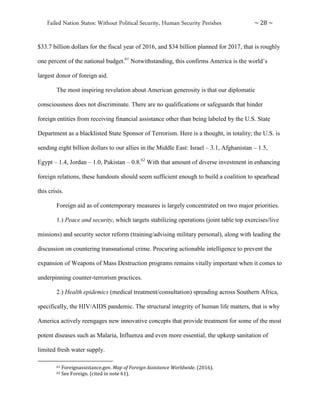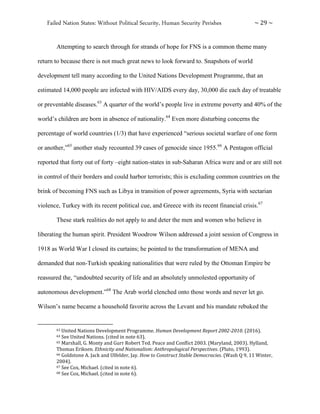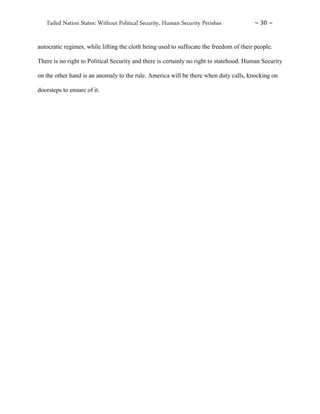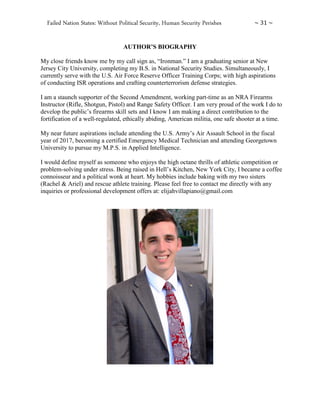This document is a senior thesis presented by Elijah Villapiano to Dr. Sylvia Presto at New Jersey City University in fulfillment of the requirements for a Bachelor of Science degree in National Security Studies. The thesis examines failed nation states and the importance of political security for ensuring human security. It acknowledges those who helped the author in preparing the thesis. The abstract provides a summary of the work, which focuses on the role of non-state actors in undermining governance in Near Eastern territories and the dangers of legitimizing non-state actors as governing authorities. The author expresses their purpose is to study conflicts to impact decision making as a member of the U.S. Air Force.
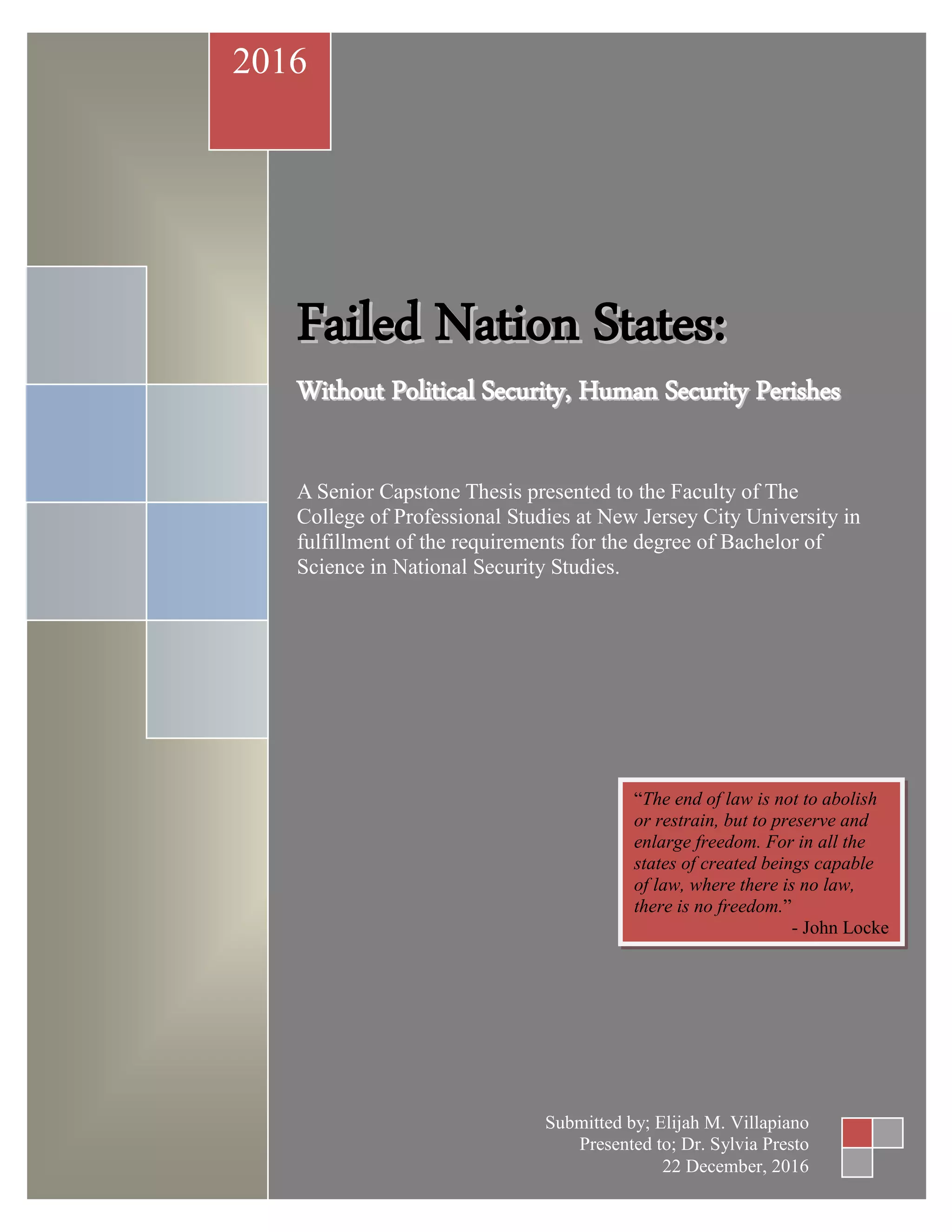
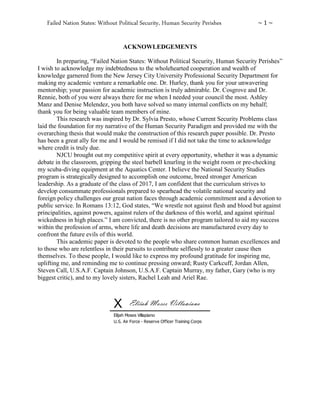

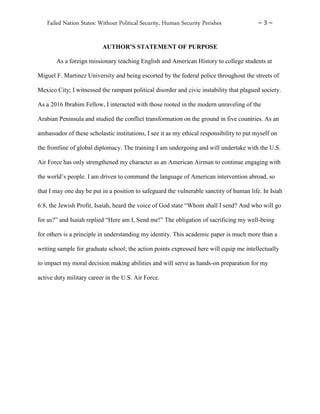
![Failed Nation States: Without Political Security, Human Security Perishes ~ 4 ~
[THIS PAGE IS LEFT BLANK INTENTIONALLY]](https://image.slidesharecdn.com/dd053858-23f5-4064-9ab4-bcff2f81c9dc-170209150015/85/FNS-Independent-Research-Project-5-320.jpg)
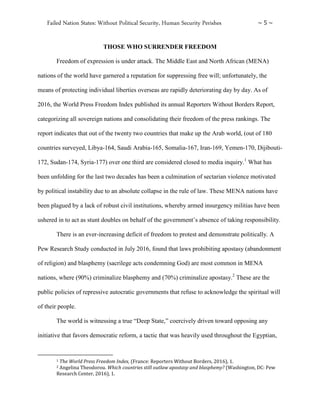
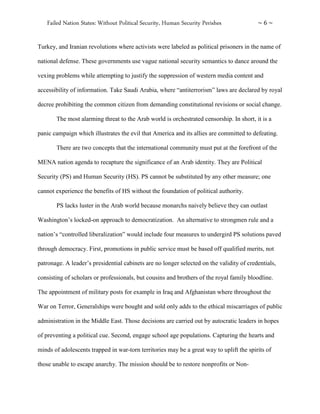
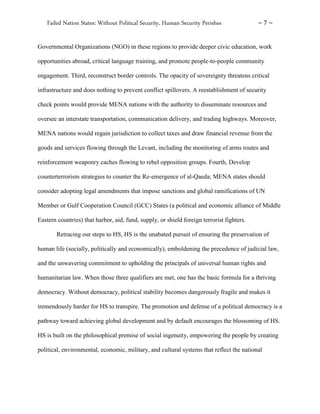
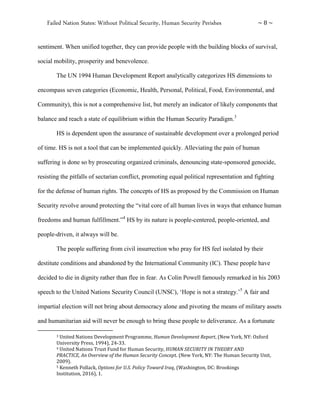
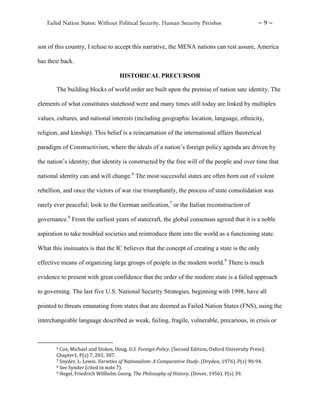
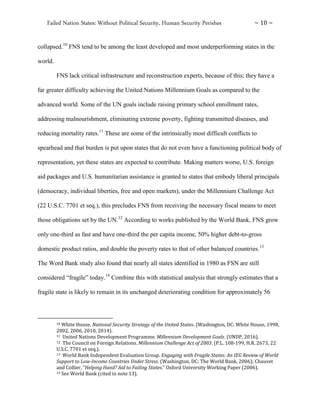
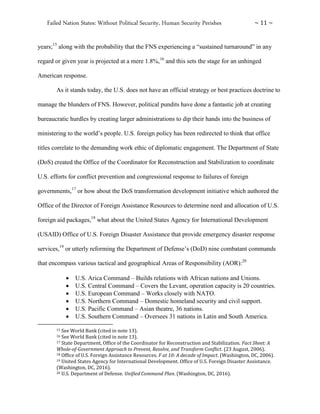
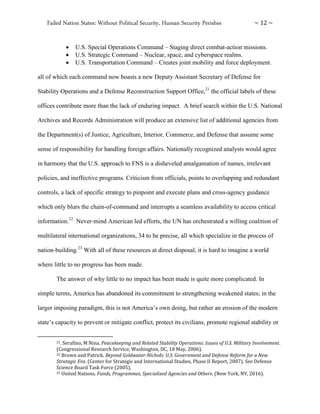
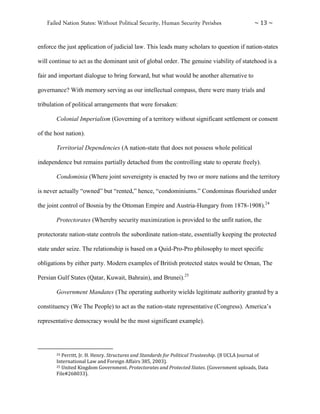
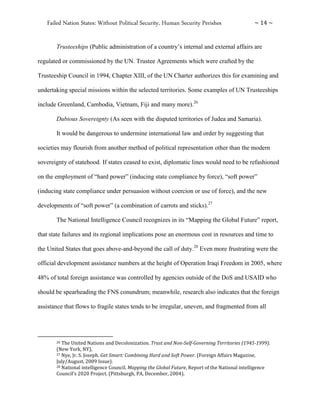
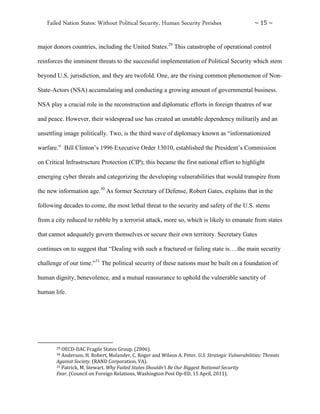
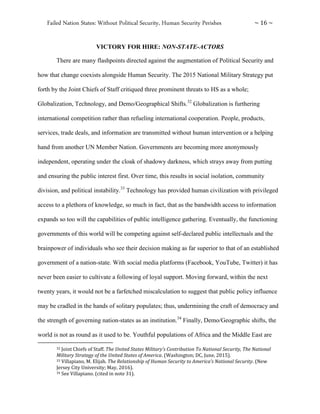
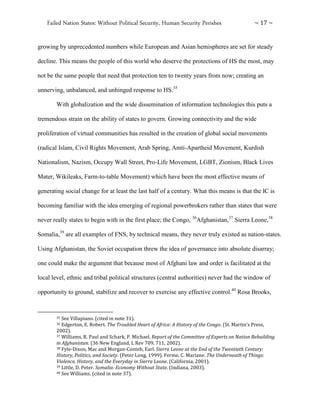
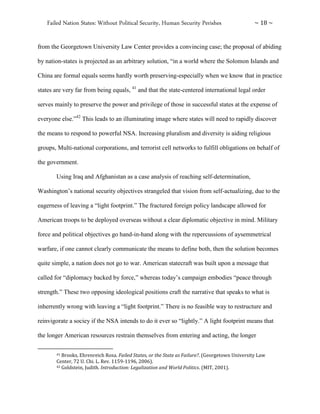
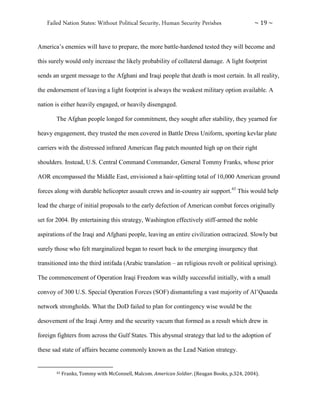
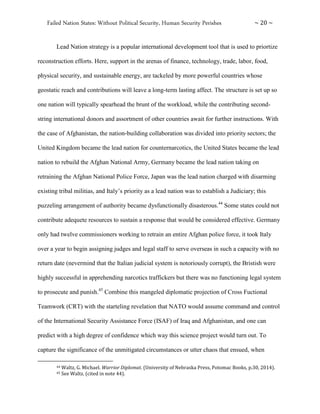
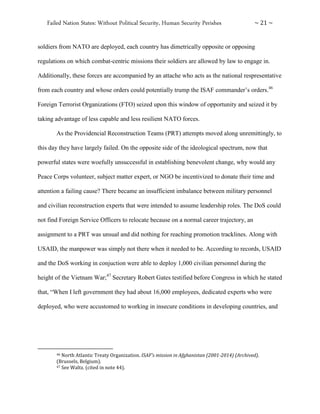
![Failed Nation States: Without Political Security, Human Security Perishes ~ 22 ~
all the specialties: agronomy, rule of law, education. When I came back into government in 2006
[USAID and DoS] had 3,000 employees and mainly was a contracting agency.”48
Aside from the historical context, another inference that can be plainly drawn is that the
growing Private Military Contrating (PMC) occupational specialty that was born out of a dire
need for underrepresented countries to assert their authority upon a particular region or to
provide a time bufferzone for the weakened state to prosper (PMC would fulfill actions on behalf
of the state which could not be facilitated). It is important to note, that although the PMC
industry choosees to broadcast their affairs as being strictly related to enhancing peacekeeping
operations, humanitarrian rescue missions, project management, sturctural engineering, and other
human services; this creates an obscure illusion far from the unvarnished truth. It would be naïve
to believe that private military corperations are solely interested in accepting government
contracts that only foster global good will. In fact, many times their work abroad incites more
violence in this world and has only donated to the unethical privatization of warefare.
Legitimate NGO and NSA are needed to guide the interactions of government, but they are not
designed to manhandle governmental affairs. At no point in time should a NSA assume temporary
authority, this is one of the root causes of FNS. A great proposal would be the reformed installation of an
Active Response Corps, which reinvigorates the philosophy of civilians being the “first responder” to
uplift their communities and provide the surge capacity to support and sustain U.S. stabilization and
reconstruction efforts abroad.49
Now, if a NSA does obtain credentialed access to assume command to
govern, with modern technology, it is frightening to imagine and even more ignorant to assume that NSA
will abide by international law.
48 Baron, W. David. Gates: ‘Congress Is Part of the Problem’ in State, USAID Shortfalls. (23 Aug, 2010).
49 Wyler, Sun Liana. Weak and Failing States: Evolving Security Threats and U.S. Policy.
(Congressional Research Service, 11 January 2008).](https://image.slidesharecdn.com/dd053858-23f5-4064-9ab4-bcff2f81c9dc-170209150015/85/FNS-Independent-Research-Project-23-320.jpg)
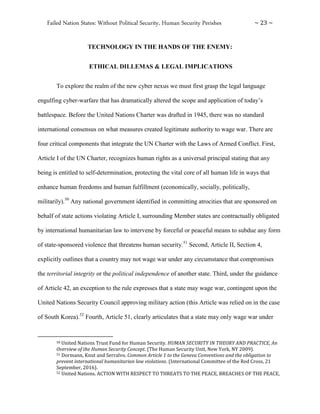
![Failed Nation States: Without Political Security, Human Security Perishes ~ 24 ~
the premise of collective self-defense; should an armed attack take place against a Member of the
United Nations.53
This is universally accepted as a natural right.
With these four standards in full effect, a peculiar legal question arises; when, if ever,
does a cyber-attack become an armed attack, and does the respondent retain their rights to
engage in acts of war as a self-defense mechanism? This is the where cyber ethics become vital.
In testimony, before the Senate, Lt. General Keith Alexander (former NSA Director and U.S.
Cyber Command Commander), explained that there is no international agreement on the precise
definition of adequate force inside or outside of cyberspace.54
General Alexander alluded to the
fact that because of this, individual nations or NSA (who will not subscribe to international
norms) may interpret different definitions and frugally apply varying thresholds for what
constitutes a legally justified use of force. This offsets the burden of legal interpretation not to
the international community (as it should be) but leaving it to the host agency conducting those
particular legal or illegal cyber-activities; so long as the agency’s interpretation of the law (at
that moment in time) is a reasonable one, compliance will stand if Congress has not addressed
the precise question of issue.55
In other words, Congress will provide organizations and
individual entities with the benefit of the doubt and the United States government holds no
warrant to limit the actions of malicious cyber activity outside its borders, even if that “agency”
is a byproduct of American Capitalist markets.
AND ACTS OF AGGRESSION. (Charter of the United Nations, Chapter VII, 216).
53 See United Nations. (cited in note 52).
54 Waxman, C. Matthew. Self-defensive Force against Cyber Attacks: Legal, Strategic, and Political
Dimensions. (U.S. Naval War College, International Law Studies (Volume 89) p.109-122, 2013).
55 Chevron v. Natural Resources Defense Council. U.S. Supreme Court Docket [No. 82-1005]. (Cornell
University Law School, Legal Information Institute, 25 June, 1984).](https://image.slidesharecdn.com/dd053858-23f5-4064-9ab4-bcff2f81c9dc-170209150015/85/FNS-Independent-Research-Project-25-320.jpg)
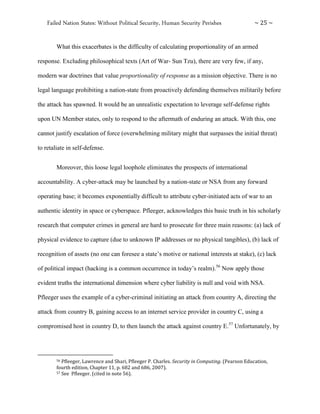
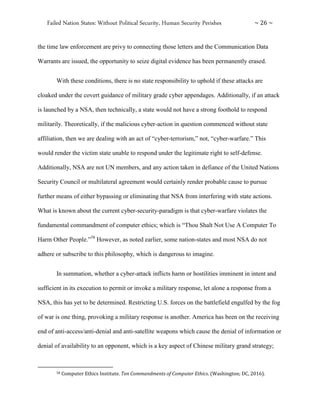
![Failed Nation States: Without Political Security, Human Security Perishes ~ 27 ~
defeating the superior with the inadequate and the inferior.59
Command, Control,
Communication and Computer (C4) functions are crucial to American military power. So what
happens when a nation-state or NSA takes it upon themselves to interfere with combat
communications using the threat of “Jamming” (electronically rendering a circuit or network
unusable by disrupting it) to interfere with American operations? Jamming along with every
other cyber-initiated act of war is at the sole discretion of the enemy. The U.S. holds global
military responsibility and by obstructing its defensive posture, by default, that cyber-attack
inflicts harm upon unintended recipients that ultimately causes excessive collateral damage.
Commander of U.S. Pacific Command, Admiral Samuel Locklear, pinpointed the discord; “we
still have to be able to operate the networks that allow us to produce combat power.”60
If one
was to deny or restrict a country’s combat power, there could not be a much more pronounced
declaration of war. The next step is the proliferating weaponization of space, which is primarily
due to a lack of international oversight and insufficient specificity in the Outer Space Treaty.
Informationized warfare has transformed into a third wave of diplomacy. Informationized war
falls outside the bracketed context of “hard” or “soft” power, and will require disciplined
Information Security (INFOSEC) professionals to provide a moral compass for the ocean of
developing information technologies.
FNS & AMERICAN BENEVOLANCE
Fostering global good will is a job that has been interminably abandoned by the United
Nations and left over for only blossoming countries to quarterback. To date, the United States
alone manages foreign policy assistance programs in over 100 nations and is projected to spend
59 Cordesman, H. Anthony and Kendall, Joseph. Chinese Space Strategy and Developments. (Center for
Strategic & International Studies, Washington: DC, 19 September, 2016).
60 Heisig, Alan & Wilgenbusch, C. Ronald. Command and Control Vulnerabilities to Communications
Jamming. (National Defense University, Second Quarter [issue 69], p.56-63, 2013.](https://image.slidesharecdn.com/dd053858-23f5-4064-9ab4-bcff2f81c9dc-170209150015/85/FNS-Independent-Research-Project-28-320.jpg)
